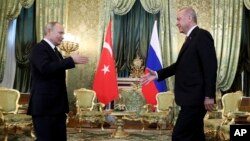Russian President Vladimir Putin on Monday hosted Turkish counterpart Recep Tayyip Erdogan for talks focusing on the situation in Syria, the sale of advanced Russian missiles to Turkey and other economic deals.
Erdogan's visit to Russia, his third this year, underlined increasingly close ties between the two countries and Turkey's readiness to defy the U.S.
Greeting Erdogan at the start of their Kremlin talks, Putin said they will discuss the delivery of Russia's top-of-the line S-400 air defense missile systems to Turkey, a move that has vexed the U.S. government, Turkey's NATO partner.
The Russian leader described the contract as a top priority in cooperation between the two countries, adding that other weapons deals are in the making.
Turkey's purchase of the Russian missiles marked the first such contract for a NATO member. Turkey has ignored U.S. demands to abandon the agreement, and Erdogan said Friday that deliveries of the S-400s will begin in July.
The Turkish leader noted that Washington had offered Ankara the U.S.-made Patriot air defense system, but said the U.S. offer isn't as favorable as Russia's.
The U.S. and other NATO allies say the S-400s aren't compatible with the alliance's weapons systems. Washington has voiced concerns that their use by Turkey could compromise security of the state-of-the art U.S. F-35 fighter jets that Turkey stands to receive.
Last week, U.S. Vice President Mike Pence warned Turkey that it was risking its NATO membership and its participation in the F-35 program by failing to cancel the missile contract with Russia.
Putin and Erdogan said in remarks at the talks that they will also discuss the completion of a pipeline that will carry Russian gas to Turkey, the planned construction of a major electric plant and other economic projects.
Erdogan said the number of Russian tourists who visited Turkey last year reached a record 6 million.
Putin and Erdogan have developed a close personal rapport and held regular meetings. Erdogan addressed Putin as ``my dear friend,'' saying that the two countries plan to expand the annual volume of their trade, currently at about $25 billion, to $100 billion.
The Russian president said Monday's talks will help deepen the "advanced, multi-faceted partnership" between the two countries.
He said that the construction of the underwater segment of the Turkish Stream gas pipeline crossing the Black Sea has just been completed, adding that it's set to come online later this year.
Russia and Turkey also have closely coordinated moves on Syria, where they struck a deal in September to create a security zone in the northern province of Idlib. That agreement averted a Syrian army offensive that sparked fears of a humanitarian catastrophe.
Russia and Iran have thrown their support behind Syrian President Bashar Assad, while Turkey has backed his foes during the eight-year war. Despite that, the three countries have teamed up to broker a peace deal for Syria, united by their shared desire to undercut U.S. clout in the region.
Russia and Turkey have opposed the U.S. military presence in Syria and welcomed U.S. President Donald Trump's announcement last fall of a planned pullout of American troops.
Putin said that Moscow and Ankara also have sought to encourage political settlement in Syria by pushing for the creation of a committee to draft the country's new constitution.








